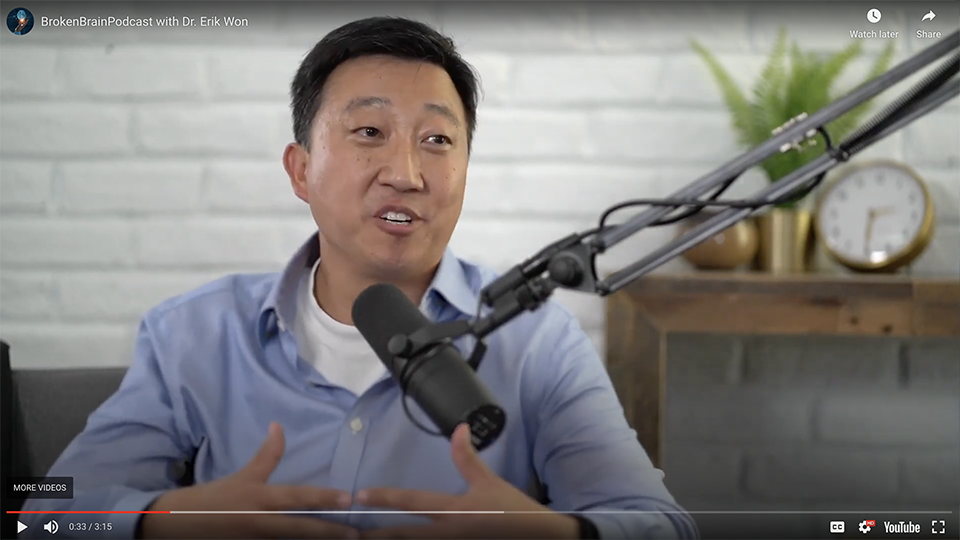
Traumatic Brain Injury Aftercare Treatment in Fort Worth
Personalized brain recovery therapy for lingering symptoms after concussion or traumatic brain injury.
Non-invasive EEG-guided MeRT helps support ongoing brain healing when symptoms persist post-medical care.
Traumatic Brain Injuries Can Leave Lasting After-effects. MeRT Can Help.
Even after medical intervention, traumatic brain injuries can leave lasting cognitive, emotional, and physical challenges. If persistent symptoms remain after initial treatment, MeRT (Magnetic e-Resonance Therapy) may help the brain function more effectively.
Injury to the brain, whether a concussion or a traumatic brain injury, can cause some serious symptoms that can disrupt quality of life and sometimes be debilitating.
At Brain Treatment Center Fort Worth, we provide individualized MeRT protocols for patients seeking a non-invasive, tailored approach to ongoing recovery following TBI.
In the months after the concussion, I just wasn’t myself… My academics began to suffer as well. I didn’t feel right. My EEG showed me that something had physically changed in how my brain functioned. After three days of treatment, I felt substantially better. After two weeks, I felt like I did before my injury. MeRT was life changing.”
– 21-year-old soccer player who suffered from TBI after-effects
Emergency First, Then Aftercare
Immediate medical evaluation is mandatory after any head injury. Only once acute issues are addressed and cleared by a doctor should MeRT be considered for lingering post-injury effects.
Common Long-Term TBI After-Effects
Symptoms that can persist after medical care include:
- Trouble concentrating or memory lapses
- Emotional dysregulation
- Sleep disturbances
- Persistent headaches
These may be rooted in irregular brainwave communication patterns—the focus of MeRT treatment.
Additional specific symptoms may include:
- Brief or extended episodes of unconsciousness
- Persistent or recurring headaches
- Ongoing fatigue or low energy levels
- Enlarged pupils and visual disturbances
- Feeling lightheaded or off balance
- Difficulty recalling recent events or retaining information
- Mental fog, disorientation, or confusion
- Noticeable decline in cognitive abilities
- Emotional reactions that seem out of context or inappropriate
- Increased irritability or frequent anger
- Symptoms of depression or low mood
- Feelings of loneliness or emotional disconnection
- Development of post-traumatic stress symptoms
- Heightened anxiety or sudden panic episodes
- Drooping or weakness in the facial muscles
- Reduced strength or paralysis of limbs or other body parts
- Loss of control of the bladder or bowel function
- Challenges with normal breathing or shortness of breath
- Tingling, numbness, or unusual sensations in various areas of the body
- Ringing in the ears or partial hearing loss
How MeRT Supports Recovery
MeRT uses advanced diagnostics, including a qEEG, to map brain activity and tailor treatment. Targeted magnetic stimulation can help gently encourage healthier brain connectivity and function.
What to Expect
- Comprehensive brain mapping
- Customized treatment plan
- Regular sessions
- Progress monitoring with repeat EEGs
Fort Worth clinicians will guide you through the whole process and answer questions along the way.
Retired NFL Player, Nick Hardwick, received MeRT for TBI Aftercare…
I’m two or three months past my last treatment, and I can honestly say that my brain is in a better place than it was before. The emotional highs and lows that I was living with have stabilized. My cognition took off during that period (of treatment), and it hasn’t slowed down since.”
Research & Evidence
MeRT is a specialized form of rTMS (repetitive transcranial magnetic stimulation) supported by rigorous scientific evidence. Clinical research shows neuromodulation techniques, such as individualized rTMS, can improve cognition and mood after TBI. Here are just a few of them:
The use of repetitive transcranial magnetic stimulation (rTMS) following traumatic brain injury (TBI): A scoping review
Evidence suggests that rTMS has the potential to be an efficacious therapeutic intervention for multiple symptoms after TBI, including depression, dizziness, central pain, and visual neglect.”
Neuromodulatory Interventions for Traumatic Brain Injury
In this special issue of the Journal of Head Trauma Rehabilitation, we share with readers some of the latest advancements in neuromodulation specific to TBI, while providing the framework to further our understanding of how and why functional skills are likely improved. While neuromodulatory interventions can play a critical role in functional recovery for those with TBI, the heterogenous nature of TBI means that clinical implementation of neuromodulation will require understanding, at the individual and group levels, of how, when, and where to alter brain activity to support sustained recovery of sensory and higher order functions.”
The role of transcranial magnetic stimulation in treating depression after traumatic brain injury
This study suggests that rTMS is a potential treatment option for depression following TBI. Both 15 to 16 session and 30 to 38 session cohorts showed significant decreases in depression as measured by PHQ-9 following rTMS treatment. These findings support the use of rTMS in post-concussion depression treatment and highlight the need for more research on rTMS therapy following TBI.”
Randomized trial of rTMS in traumatic brain injury: improved subjective neurobehavioral symptoms and increases in EEG delta activity
Subjective measures of depression, sleep dysfunction, post-concussive symptoms (PCS), and executive function showed significant improvement with stimulation, retaining improved levels at two-week follow-up. EEG delta power exhibited elevation one week after stimulation cessation.”
Neural mechanisms of emotional health in traumatic brain injury patients undergoing rTMS treatment
Our findings uncover the neural mechanisms underlying the improvement in emotional well-being in TBI due to application of neuromodulation. The main effect of rTMS is to reduce emotional disorders and hence consequently it may improve cognitive and executive functions.”
Low frequency transcranial magnetic stimulation for cognitive recovery after traumatic brain injury: A case report
Our results are consistent with studies showing improved cognitive functioning in TBI following a unilateral or bilateral rTMS protocol that used low frequency rTMS over the right DLPFC. Therefore, this stimulation site may be promising for improving cognitive recovery in TBI, especially when combined with cognitive rehabilitation.”
Repetitive Transcranial Magnetic Stimulation for Treatment of Depression in a Patient With Severe Traumatic Brain Injury
Case Report: A 37-year-old male with history of anxiety and bipolar depression incurred a TBI after a 60-foot fall. After his physical recovery, the patient had refractory depression. Eight months after the TBI event, he underwent a 6-week course of rTMS treatment and had a 70.8% improvement in mood symptoms by the end of the therapy as indicated by the Patient Health Questionnaire-9, transitioning from severe to mild depression according to the scoring system. Clinical correlation during the months following conclusion of rTMS therapy showed no signs of remission or adverse side effects. The patient remains stable and lives independently 1 year after treatment with mood-stabilizing medications.
“Conclusion: This case provides evidence for successful treatment of refractory depressive symptoms after severe TBI with the addition of rTMS to psychotherapy and mood-stabilizing medications, supporting the safety and tolerability of this novel therapeutic approach. Further studies are needed to validate the contribution of rTMS for management of mood symptoms in patients with TBI.”
Contact our New Patient Coordinator
for a
No Obligation Consultation
Or fill in the form at the bottom of the page for more information or to book an initial consultation.
“I have a whole new lease on life.”
Everything changed when I started treatment. Within two weeks, I was sleeping better. I was off all 12 of the meds I was on when I began treatment, and I was starting to enjoy life again. After the first month, I was socializing with people, I was able to work out for the first time in years, and I started to help my wife with the bills and our budget.
“As I write this, I just completed my sixth week of treatment. A conservative estimate is that I have had a 60–70% reduction of the symptoms I listed above, and I have a whole new lease on life. I can focus and I feel good about myself. I feel confident. And I laugh again. Most importantly, I can feel the love for and from my family again.”
– DAVID, MERT PATIENT
Our Medical Director
Dr. Spencer O. Miller is the owner and Medical Director of the Brain Treatment Centers in Fort Worth, Dallas, and Plano. He is a board-certified neurologist who has been in practice for 15 years.
Dr. Miller specializes in MeRT® (Magnetic e-Resonance Therapy) treatment of traumatic brain injury, depression, post-traumatic stress disorder, dementia, autism, and multiple other neurological conditions.
He is also affiliated with Baylor University Medical Center, where he specializes in stroke, headache medicine, traumatic brain injury, post-traumatic stress disorder, and seizures.
Testimonial: After MeRT Treatment
A Talk with Dr. Erik Won about MeRT on The Broken Brain Podcast
The Broken Brain Podcast, known for delving into the complexities of brain and body health, featured an eye-opening episode focused on Magnetic e-Resonance Therapy (MeRT) as a groundbreaking approach to treating neurological conditions—particularly Traumatic Brain Injury (TBI).
Dr. Erik Won, President and Chief Medical Officer of Wave Neuroscience, the company behind MeRT, shared insights on the therapy’s powerful impact. He discussed its use with military veterans struggling with conditions such as depression, PTSD, and TBI as a result of their service. Dr. Won also shared remarkable stories of recovery, highlighting how MeRT has helped transform the lives of many veterans, restoring functionality and improving quality of life where other treatments had fallen short.

Hear from more of those who received MeRT for Head Injuries
“I’m back! My TBI turned me into someone I barely recognized. I was depressed, mean, and short-tempered. I pushed through life filled with frustration and a deep sense of sadness that this was it. And I just had to keep pushing through life with an overwhelming tiredness.
“I’m so glad I was wrong. I think my direct reports and family are even more thankful. This treatment changed everything, and I am forever thankful.”
41-year-old male with TBI
“I was offered the opportunity to attend the BTC to help with the effects of the TBIs I had endured over 21 years of Military Service. And I am absolutely glad I did so — I felt the positive effects of the treatment in the first 3 days.
“I had irritability issues, although California Traffic will do that to you, and sleeping issues, among other things. On Day 3, I started sleeping through the night. And not just sleeping, but sleeping hard and dreaming. So I know I was in R.E.M. sleep.
“It has helped me focus, feel more energetic, less irritable, more caring to others, and helped with joint pain and tinnitus. The staff is also very amazing and extremely professional. I highly recommend the BTC. Trust the process, and you’ll have the same results as I did.”
=TBI Patient
Patient“I did six weeks of therapy at the Brain Treatment Center. I started therapy with anxiety and depression due to traumatic brain injury. After the third week, it felt like a weight was lifted off my shoulders. I started to have ah-ha moments, but it was about things I already knew.
“The therapy allowed me to clear my brain and concentrate on things. I was no longer spiraling about things that really didn’t matter but seemed real at the time. Thank you for my life back.”
TBI Patient
“The team at the Brain Treatment Center are the most genuinely kind people you will ever meet. And the MeRT treatment has made a HUGE quality of life positive change for me.
“I am a vet who got blown up a couple of times and I suffer from TBI and PTSD. These sessions have turned my life around. My wife notices the positive changes in my depression, anxiety, and irritability and says I am fun to be around again.
“I can’t say enough great things about this place. Thank God it exists!”
Cyrus B.
“I’ve made significant progress in cognitive ability, stress tolerance, and mental clarity. I have been able to handle decisions much better and think clearer. And I have been able to significantly decrease conflict with my family and actually lead much better.”
Male with TBI
“In the ensuing months after the concussion, I just wasn’t myself. My academics began to suffer as well. I didn’t feel right. My EEG showed me that something had physically changed with how my brain functioned.
“After three days of treatment, I felt substantially better. After two weeks, I felt like I did before my injury. MeRT was life changing.”
21-year-old female with TBI
“I’d just always ‘outworked’ it. After the last concussion, that wasn’t an option, even though I had previously walked off a dozen concussions. It’s vital to know that not all TBIs result in massive concussions, but they all add to the erosion of the mind and self if untreated.
“Through EEG, MeRT, and some subtle sleep and attention shifts, I’ve had a radical, nourishing, strengthening, and dare I say, ‘healing,’ that has brought me to see life through a filter I’ve never known was available.
“Giving life a chance is sometimes just staying in ‘the Try.’ If you are damaged, confused, and at the end, know that you have allies that you’ve never met before.”
Tait Fletcher
Stunt PerformerContact our New Patient Coordinator for More Information about MeRT
We’re Here to Help – No Pressure, Just Support
Our dedicated New Patient Coordinator is available Monday through Friday to answer any questions you may have—no pressure, no obligation. Whether you’re curious about how MeRT works, want details on the treatment process, or have questions about pricing or insurance, she’s here to provide clear, compassionate guidance.
If you decide you’d like to explore MeRT further, she can assist in scheduling your next steps. This includes a non-invasive brain scan (qEEG) followed by a consultation a few days later.
After your qEEG is completed, Dr. Spencer O. Miller will thoroughly review your results alongside your symptoms to gain a detailed understanding of your brain activity. During your consultation, we’ll walk you through the findings and explain what they may mean for your neurological health.
Hope Begins with Information
We encourage you to reach out and learn more. Gathering information is the first step toward making an informed decision about whether MeRT may be a helpful option for you or your loved one. With a strong track record of success in treating a range of brain-based conditions, we’ve seen many lives change for the better.
At this stage, we’ll help determine whether MeRT is a good fit—and from there, the decision to proceed is entirely yours.

